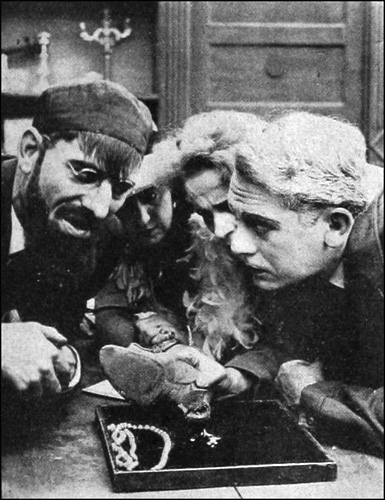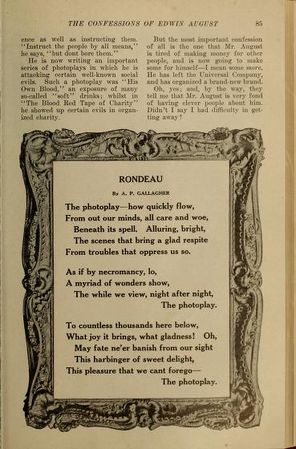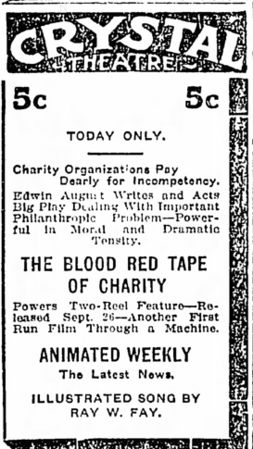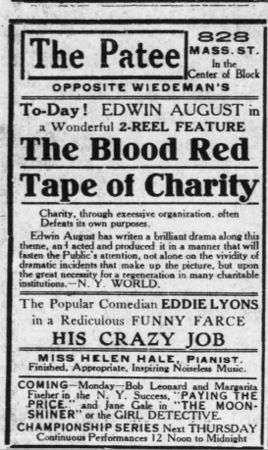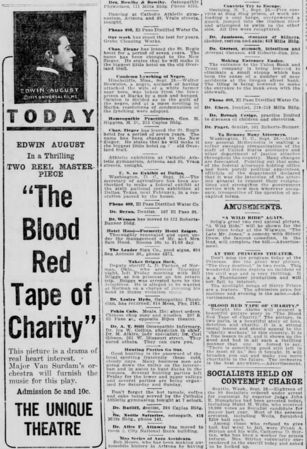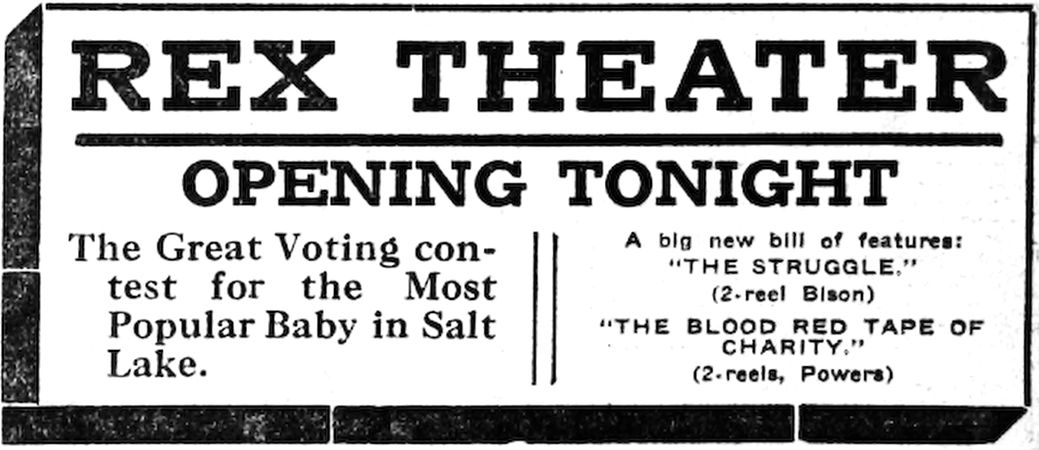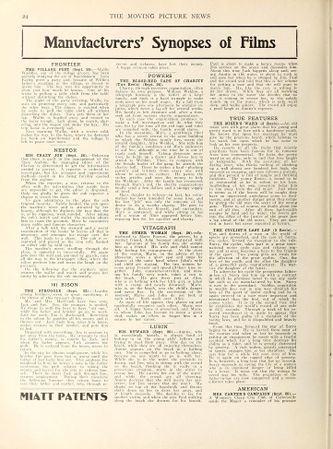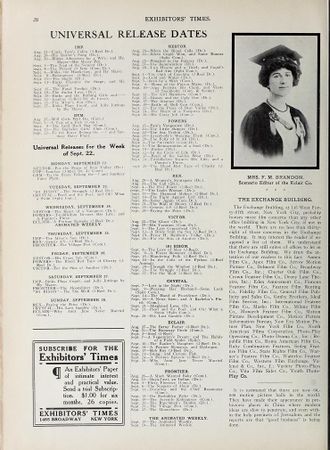The Blood Red Tape of Charity (lost Universal silent short propaganda drama film; 1913)
The Blood Red Tape of Charity is a 1913 silent short drama propaganda film distributed by Universal Film Manufacturing Company under its Powers label.[1] Written and directed by Edwin August, it stars August as a gentleman thief called Marx attempting to help the Weldon family, who have fallen onto hard times and were unable to receive timely aid from charities because of the organizations' "red tape" regulations.
Background
Edwin August conceptualized The Blood Red Tape of Charity as a propaganda film in an attempt to expose the issues surrounding charitable institutions, whose excessive organization and "red tape" prevented them from being effective.[2] Advertisements from the Crystal Theater, Lawrence Journal-World and El Paso Herald focused on the propaganda aspect of the film, claiming it would highlight charitable organizations' incompetency with the intent to regenerate them, as well as encouraging people to become more charitable themselves.[3][4][5]
This made the film controversial upon release, with the Charity Organisation Societies criticizing the exaggerated incompetency of the charities depicted in the film and the family's troubles caused by it.[6] The Charity Organization Movement in the United States: A Study in American Philanthropy, Volume 19 believed the film had distorted facts in order to criticize organized charity.[7] A review in Moving Picture World praised the film for its photography and for some "strong moments", but criticized the acting for being both "melodramatic and insincere".[8]
Additionally, two scholars, Jon Mirsalis and Michael Blake claimed Lon Chaney features in the film uncredited as a Jewish pawnbroker.[9] This is based on the surviving still featuring Marx haggling with the pawnbroker, included in Patricia Erens' 1988 book The Jew in American Cinema as an example of how films historically depicted Jewish people.[10]
Plot
While the film itself is lost, The Blood Red Tape of Charity's plot remains accessible as it featured in an issue of Moving Picture News.[11] According to the description, telegraph linesman and father William Weldon struggles to sustain his large family because of his low salary. He suddenly is injured and unable to work for many weeks following him falling off a telegraph pole. His family turns towards charity organizations for help, but despite them promising assistance, they cannot do so in a timely fashion to prevent the family from starving because of their regulations.
Meanwhile, Marx the gentleman thief meets William's daughter, Alice, having lived in the same building as the Weldon family via a secret retreat. Although Marx himself lacks available money in hand, he decides to help the family, firstly by forcing a doctor to attend to the family's needs, then with the help of a gang, attends a charity ball with the intent to steal valuables from the attendees. These are then pawned, with the money going towards assisting the Weldons. Only after the family recovers do the charities send money and food to them. Marx ultimately decides to turn himself into the police, having long intended to reform. While in his prison cell, he sees a vision of Alice, who thanks him for sacrificing his freedom through such a charitable act.
Availability
The Blood Red Tape of Charity is now a lost film. The reason behind why or when the film became lost is unknown. Nevertheless, if any copies were in Universal's vaults, the company ultimately would have deliberately destroyed them alongside all other copies of their silent films in 1948.[12] The surviving still and plot details are all that remains of the film.
Gallery
External Link
References
- ↑ Archived Exhibitors' Times, detailing the film's release date under the Powers label. Retrieved 23 Apr '21
- ↑ Archived Motion Picture Magazine, detailing from an interview August's motivation for writing The Blood Red Tape of Charity. Retrieved 23 Apr '21
- ↑ Crystal Theater advertisement of the film. Retrieved 23 Apr '21
- ↑ El Paso Herald clipping advertising the film. Retrieved 23 Apr '21
- ↑ Lawrence Daily Journal-World clipping advertising the film. Retrieved 23 Apr '21
- ↑ Volume 4 of the Charity Organization Bulletin, containing the criticism of the film by Charity Organisation Societies Retrieved 23 Apr '21
- ↑ Archived The Charity Organization Movement in the United States: A Study in American Philanthropy, Volume 19, criticizing The Blood Red Tape of Charity Retrieved 23 Apr '21
- ↑ Lon Chaney website, containing Jon Mirsalis' claim Lon Chaney played the pawnbroker, as well as providing the Moving Picture World review. Retrieved 23 Apr '21
- ↑ The Films of Lon Chaney, containing Michael Blake's claim that Lon Chaney was featured as the pawnbroker. Retrieved 23 Apr '21
- ↑ The Jew in American Cinema, which contained the surviving still. Retrieved 23 Apr '21
- ↑ Archived Moving Picture News, containing the film's plot. Retrieved 23 Apr '21
- ↑ The Atlantic article concerning Universal destroying most of its silent films, possibly including The Blood Red Tape of Charity. Retrieved 23 Apr '21
